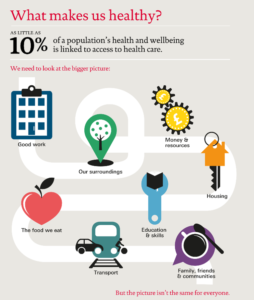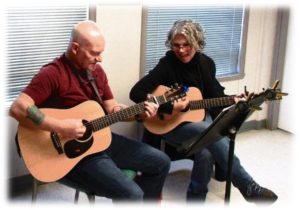Guest blog post by Claire Speed and Ian Ritchie.
“Music and rhythm find their way into the secret places of the soul” Plato
In June 2019, two national conferences took place over the same two days in Ottawa. One focused on Community Health Connections, the other on the Orchestra of the 21st Century. On the surface, neither had much to do with the other. One was about health, the other about the arts. But they shared a common goal: to create healthier, more inclusive communities.

We have never been in doubt about the healing powers of the arts but their value has not been fully realized nor embraced. This attitude, however, may be changing. Today, there is a growing movement, in Canada and internationally, to increase awareness among politicians and the medical community about the potential of the arts to cure: “The power of music to integrate and cure…is quite fundamental. It is the profoundest nonchemical medication.” (Oliver Sacks, “Awakenings”) Funding shortages have forced some governments to think differently about how they deliver healthcare, away from hospital-centred care and over-prescribing of medications to more patient-centred self-care. As stated in a 2017 report by the All-Party Parliamentary Group on Arts, Health and Wellbeing in the U.K. “up to a fifth of patients see a G.P. for a problem that requires a social solution.” To address this statistic, some primary care workers are now taking a more proactive approach to healing through social prescribing which is defined as: “a co-creative effort between a health care provider and a patient that recognizes and responds to a patient’s strengths, interests and health needs” (Social Prescribing in Ontario: Progress Report, June 2019). Social prescriptions, therefore, do not presently aim to replace the main ingredients of primary medicine but are seen to be complementary.
While good health care practitioners in Canada have been involved in this work for decades, the Social Prescribing movement has brought the terminology and associated momentum from UK to Canada and in particular Ontario with a project funded by the Ontario Ministry of Health and Long-Term Care and overseen by the Alliance for Healthier Communities, a network of equity-focused community-governed primary health care organizations that include Community Health Centres (CHCs). The Alliance presented sessions on Social Prescribing at the two national conferences in Ottawa in June. In relation to orchestras, we believe it should be a natural progression for them to extend their mandates (and funding sources) to include health and wellbeing just as they have done for many years in education: this would offer new opportunities to deploy the power of music beyond those attending concert venues and places of learning to reach across the whole human spectrum, from newborns to those in palliative care. At first sight there are few obvious ways for orchestras to engage in social prescribing except in a volunteering capacity, as is currently happening, or by providing free tickets and the opportunity to be a part of the audience. If we target and treat audiences in the right way, this can form part of the current social prescription model.
 During the particular session at the Orchestras Canada conference on “Social Prescribing and Orchestras”, Sonia Hsiung, who is leading the Ontario initiative at the Alliance for Healthier Communities, posed the following question: “Where do you see the role of orchestras in enhancing wellbeing and creating community belonging?” Some examples of successful partnerships between the Arts community and CHCs were presented at the two June conferences. South Riverdale CHC’s chronic pain management program, in partnership with the Art Gallery of Ontario, provides training for Peer Ambassadors to lead gallery visits and art-making workshops “with the lens of health and well-being to support self-management and healthy living” for people who have similar lived experience. What if orchestras across Canada are able to co-design similar community-specific arrangements with local healthcare providers that create facilitated access for those with health and social barriers and unable to attend otherwise? Or if docent programs run by the orchestra’s volunteer committee could include CHC clients identified for their love of children to help out with pre-concert activities at family concerts? With sufficient desire and adequate support, many more innovative partnerships like this one in Toronto could be piloted.
During the particular session at the Orchestras Canada conference on “Social Prescribing and Orchestras”, Sonia Hsiung, who is leading the Ontario initiative at the Alliance for Healthier Communities, posed the following question: “Where do you see the role of orchestras in enhancing wellbeing and creating community belonging?” Some examples of successful partnerships between the Arts community and CHCs were presented at the two June conferences. South Riverdale CHC’s chronic pain management program, in partnership with the Art Gallery of Ontario, provides training for Peer Ambassadors to lead gallery visits and art-making workshops “with the lens of health and well-being to support self-management and healthy living” for people who have similar lived experience. What if orchestras across Canada are able to co-design similar community-specific arrangements with local healthcare providers that create facilitated access for those with health and social barriers and unable to attend otherwise? Or if docent programs run by the orchestra’s volunteer committee could include CHC clients identified for their love of children to help out with pre-concert activities at family concerts? With sufficient desire and adequate support, many more innovative partnerships like this one in Toronto could be piloted.
We believe music’s relationship with health and wellbeing can be viewed as four overlapping circles – ‘music therapy’, ‘music medicine’, ‘music care’ and ‘music in the community’. The different ways in which music and the arts can benefit society, in terms of health, wellbeing, care and community, suggest that our profession should not be totally reliant on cultural streams of income, public or private, but also find financial recognition from those delivering education, healthcare and social welfare. A more integrated and holistic approach to funding would enrich all the interconnected areas of work.
This leads naturally to the idea that social prescribing – currently valued as a beneficial social and community complement to clinical practice but largely reliant upon informal artistic and other social opportunities that are voluntary or receive one-time funding envelopes – may possibly one day be equally valued alongside pharmaceutical prescription for its health impacts and built in to the formal healthcare system. The UK government’s announcement in October 2019 of funding for a new Academy of Social Prescribing, with the purpose of regulating provision and making this available for every patient in the country, is an important step in the right direction. Also encouraging is the 2019 report by the World Health Organization “on the role of the arts in improving health and well-being”. Maybe Ontario, along with other provinces in Canada, will be next to embrace social prescribing for all patients? Until then, we can seek opportunities to partner, experiment, demonstrate and advocate for the healing power of music and the arts.
Health and well-being are simultaneously local and global issues. In traditional cultures, effective medical remedies have always been locally grown and sourced. As far as the arts are concerned, international success in creation or curation is normally dependent on the strength of the local roots and identity of the works and their makers. So the activities and networks for social prescribing – and for the nexus of arts, health and wellbeing in general – will continue to develop locally and be shared abroad: the world is our home and vice versa.
Ian Ritchie lives in London, UK and is Artistic Advisor, Setubal Music Festival as well as Artistic Director, The Musical Brain and Joint Chair, Music Action International. Claire Speed lives in Ottawa, Canada and is an Independent Consultant & Facilitator for the Arts/Health/Community. Musico-Nexus is being established as an international entity by Ian and Claire to create projects, curate events and develop networks which support music’s powerful and beneficial contribution to people’s health and wellbeing, social inclusion and interdisciplinary practice. For more information or to make contact: [email protected]
